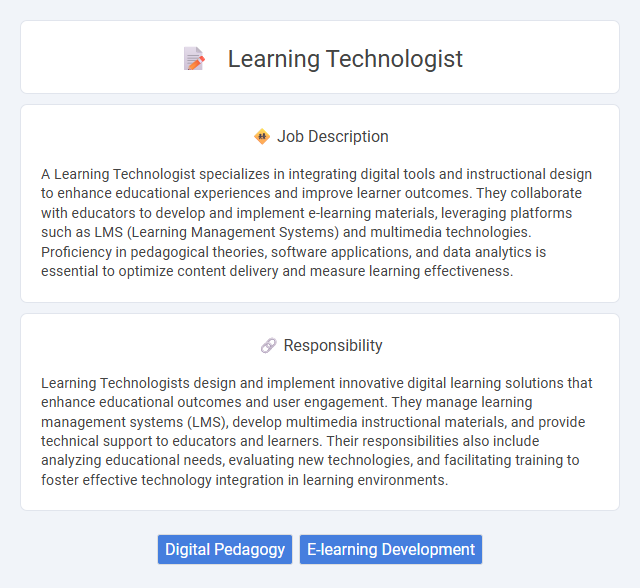
A Learning Technologist specializes in integrating digital tools and instructional design to enhance educational experiences and improve learner outcomes. They collaborate with educators to develop and implement e-learning materials, leveraging platforms such as LMS (Learning Management Systems) and multimedia technologies. Proficiency in pedagogical theories, software applications, and data analytics is essential to optimize content delivery and measure learning effectiveness.
Individuals with a passion for educational technology and strong problem-solving skills are likely to thrive as Learning Technologists. Those who enjoy blending creativity with technical expertise to enhance learning experiences may find this role highly suitable. People who prefer collaborative environments and continuous professional development probably fit well in this position.
Qualification
A Learning Technologist typically requires a strong foundation in educational technology, instructional design, or a related field, often supported by a bachelor's or master's degree. Proficiency in digital learning platforms, multimedia tools, and learning management systems (LMS) such as Moodle or Blackboard is essential. Certifications in e-learning authoring tools like Articulate Storyline or Adobe Captivate and experience with pedagogical theories enhance candidate qualifications significantly.
Responsibility
Learning Technologists design and implement innovative digital learning solutions that enhance educational outcomes and user engagement. They manage learning management systems (LMS), develop multimedia instructional materials, and provide technical support to educators and learners. Their responsibilities also include analyzing educational needs, evaluating new technologies, and facilitating training to foster effective technology integration in learning environments.
Benefit
A Learning Technologist likely enhances educational outcomes by integrating advanced digital tools and innovative instructional design, improving learner engagement and retention. The role probably boosts institutional efficiency by streamlining technology adoption and providing tailored training solutions for educators. This position may also foster continuous professional development, supporting adaptive learning environments that respond to evolving educational needs.
Challenge
Learning Technologist roles likely involve navigating the challenge of integrating emerging digital tools with traditional educational methods to enhance learner engagement and outcomes. The complexity of aligning technology solutions with diverse teaching needs and institutional goals may require continuous adaptation and problem-solving skills. There is a probable demand for balancing technical expertise with pedagogical understanding to effectively support educators and learners.
Career Advancement
Learning Technologists enhance educational experiences by integrating digital tools and instructional design, positioning themselves as key players in modern education. Mastery of e-learning platforms, data analytics, and project management accelerates career advancement opportunities, leading to roles such as Senior Learning Technologist, Learning Experience Designer, or Digital Learning Manager. Continuous professional development and certification in emerging technologies amplify career growth and industry relevance.
Key Terms
Digital Pedagogy
Learning Technologists specializing in Digital Pedagogy design and implement innovative technology-driven teaching strategies that enhance student engagement and learning outcomes. They leverage tools such as learning management systems, multimedia content, and interactive platforms to create immersive educational experiences tailored to diverse learning styles. Expertise in digital pedagogy enables these professionals to integrate instructional design principles with emerging technologies to optimize curriculum delivery in online and hybrid learning environments.
E-learning Development
Learning Technologists specializing in e-learning development design, implement, and evaluate digital educational content to enhance learner engagement and outcomes. They utilize authoring tools such as Articulate Storyline, Adobe Captivate, and LMS platforms like Moodle or Canvas to create interactive modules and assessments. Expertise in instructional design principles, multimedia integration, and user experience optimization ensures scalable and effective online learning solutions.
 kuljobs.com
kuljobs.com